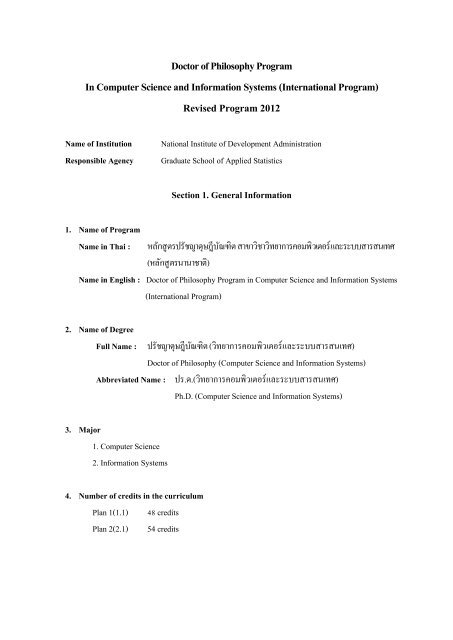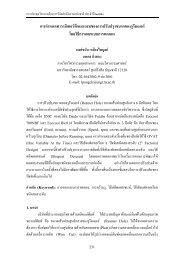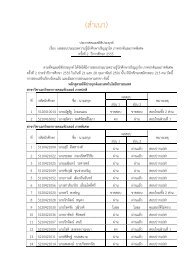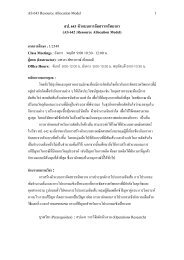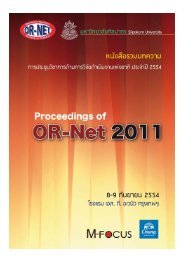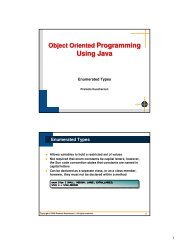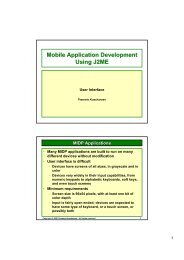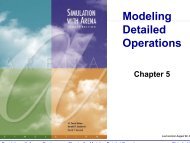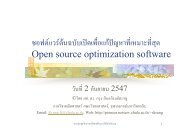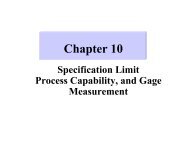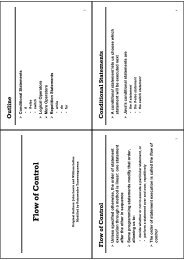Doctor of Philosophy Program In Computer Science and ... - AS Nida
Doctor of Philosophy Program In Computer Science and ... - AS Nida
Doctor of Philosophy Program In Computer Science and ... - AS Nida
You also want an ePaper? Increase the reach of your titles
YUMPU automatically turns print PDFs into web optimized ePapers that Google loves.
<strong>Doctor</strong> <strong>of</strong> <strong>Philosophy</strong> <strong>Program</strong><br />
<strong>In</strong> <strong>Computer</strong> <strong>Science</strong> <strong>and</strong> <strong>In</strong>formation Systems (<strong>In</strong>ternational <strong>Program</strong>)<br />
Revised <strong>Program</strong> 2012<br />
Name <strong>of</strong> <strong>In</strong>stitution National <strong>In</strong>stitute <strong>of</strong> Development Administration<br />
Responsible Agency Graduate School <strong>of</strong> Applied Statistics<br />
Section 1. General <strong>In</strong>formation<br />
1. Name <strong>of</strong> <strong>Program</strong><br />
Name in Thai : หลักสูตรปรัชญาดุษฎีบัณฑิต สาขาวิชาวิทยาการคอมพิวเตอร์และระบบสารสนเทศ<br />
(หลักสูตรนานาชาติ)<br />
Name in English : <strong>Doctor</strong> <strong>of</strong> <strong>Philosophy</strong> <strong>Program</strong> in <strong>Computer</strong> <strong>Science</strong> <strong>and</strong> <strong>In</strong>formation Systems<br />
(<strong>In</strong>ternational <strong>Program</strong>)<br />
2. Name <strong>of</strong> Degree<br />
Full Name : ปรัชญาดุษฎีบัณฑิต (วิทยาการคอมพิวเตอร์และระบบสารสนเทศ)<br />
<strong>Doctor</strong> <strong>of</strong> <strong>Philosophy</strong> (<strong>Computer</strong> <strong>Science</strong> <strong>and</strong> <strong>In</strong>formation Systems)<br />
Abbreviated Name : ปร.ด.(วิทยาการคอมพิวเตอร์และระบบสารสนเทศ)<br />
Ph.D. (<strong>Computer</strong> <strong>Science</strong> <strong>and</strong> <strong>In</strong>formation Systems)<br />
3. Major<br />
1. <strong>Computer</strong> <strong>Science</strong><br />
2. <strong>In</strong>formation Systems<br />
4. Number <strong>of</strong> credits in the curriculum<br />
Plan 1(1.1) 48 credits<br />
Plan 2(2.1) 54 credits
5. Characteristic <strong>of</strong> the <strong>Program</strong><br />
5.1 Characteristic<br />
<strong>Doctor</strong>ate degree according to the st<strong>and</strong>ard <strong>of</strong> higher education program<br />
5.2 Medium <strong>of</strong> <strong>In</strong>struction<br />
English<br />
5.3 Admissions<br />
Open for Thai <strong>and</strong> <strong>In</strong>ternational graduates with a master's degree in <strong>Computer</strong> <strong>Science</strong>,<br />
<strong>In</strong>formation Systems Management, <strong>Computer</strong> Engineering, <strong>and</strong> <strong>In</strong>formation Technology or in the<br />
related fields, having a good comm<strong>and</strong> <strong>of</strong> English, graduated from the institutes both domestic <strong>and</strong><br />
abroad, which have been accredited by the Commission on Higher Education (CHE)<br />
5.4 Cooperation with Other <strong>In</strong>stitutes<br />
Educational <strong>In</strong>stitutes <strong>and</strong> Universities with collaboration agreements.<br />
5.5 Presenting the Degree to the Graduates<br />
The same degree will be provided for both majors.<br />
6. Curriculum Status <strong>and</strong> the Consideration for Approval / Endorsement <strong>of</strong> the Curriculum<br />
Improved Curriculum 2012 <strong>of</strong>fered at the second semester, academic year 2012<br />
Committee <strong>of</strong> the Academic Council authorized / approved the curriculum at its 3 rd meeting on August 17,<br />
2012<br />
The Council <strong>of</strong> the National <strong>In</strong>stitute <strong>of</strong> Development Administration authorized / approved the<br />
curriculum at its 8 th meeting (special) on August 22, 2012<br />
7. Readiness in Publishing the Curriculum with Quality <strong>and</strong> St<strong>and</strong>ards<br />
The curriculum is ready to be published with quality <strong>and</strong> st<strong>and</strong>ards according to Qualification<br />
St<strong>and</strong>ards in the academic year 2014<br />
8. Pr<strong>of</strong>essionals to undertake after graduation<br />
8.1 Scholars / pr<strong>of</strong>essors in educational institutions<br />
8.2 Researchers in computer <strong>and</strong> information technology<br />
8.3 Executives on information technology <strong>and</strong> information systems management in both public<br />
<strong>and</strong> private organizations
9. Name, Identification Number, ID Card, Position <strong>and</strong> Qualifications <strong>of</strong> the <strong>In</strong>structors<br />
Responsible for the Curriculum<br />
Name-Family Name ID Card Highest qualification / <strong>In</strong>stitute <strong>of</strong><br />
Assoc. Pr<strong>of</strong>. Dr. Surapong<br />
Auwatanamongkol<br />
Assoc. Pr<strong>of</strong>. Dr.Pipat<br />
Hiranvanichakorn<br />
Asst.Pr<strong>of</strong>. Dr.Pramote<br />
Kuacharoen<br />
Number<br />
Branches.<br />
xxxxxxxxxxxxx Ph.D.(<strong>Computer</strong><br />
<strong>Science</strong>)<br />
xxxxxxxxxxxxx D.E. (<strong>In</strong>formation<br />
Processing)<br />
xxxxxxxxxxxxx Ph.D.(Electrical <strong>and</strong><br />
<strong>Computer</strong> Engineering)<br />
Attainment<br />
Southern Methodist<br />
University, USA.<br />
Tokyo <strong>In</strong>stitute <strong>of</strong><br />
Technology, Japan<br />
Georgia <strong>In</strong>stitute <strong>of</strong><br />
Technology, USA.<br />
10. Place for Studying<br />
Graduate School <strong>of</strong> Applied Statistics, class rooms <strong>and</strong> places for studying <strong>of</strong> the National <strong>In</strong>stitute<br />
<strong>of</strong> Development Administration<br />
11. External Circumstances or Developments that Need to be Taken <strong>In</strong>to Consideration in<br />
Planning the Curriculum<br />
The rapid advancement <strong>of</strong> information technology contributes to the changes, opportunities <strong>and</strong><br />
threats to the economy <strong>and</strong> society. Thail<strong>and</strong> must be prepared to cope with such changes. The<br />
strategic goals <strong>of</strong> the country's information technology policies <strong>and</strong> communication have, therefore,<br />
been set for the development <strong>of</strong> many <strong>of</strong> qualified human resources <strong>and</strong> researchers in information<br />
technology to accommodate the situation.<br />
12. Impact <strong>of</strong> Item 11 on the Development <strong>of</strong> the Curriculum <strong>and</strong> Its Relevance to the Mission <strong>of</strong><br />
the <strong>In</strong>stitute<br />
12.1 Curriculum Development
Based on the external circumstances in Item 11, it is necessary to develop a curriculum to<br />
produce graduates with a doctorate in computer science <strong>and</strong> information systems with knowledge <strong>and</strong><br />
ability to do research <strong>and</strong> apply knowledge to practical. The graduates must be good moral persons<br />
according to the policies <strong>and</strong> vision <strong>of</strong> the NIDA in producing the knowledgable graduates with ethics.<br />
12.2 Relevant to the Mission <strong>of</strong> the <strong>In</strong>stitution<br />
The curriculum is consistent with the mission <strong>of</strong> the <strong>In</strong>stitute, that is to produce doctorate<br />
graduates with knowledge <strong>and</strong> virtue who will be the leaders in the development <strong>of</strong> both the economy <strong>and</strong><br />
society <strong>of</strong> the country.<br />
13. Relationship with Other <strong>Program</strong>s Offered in Other Schools / Departments <strong>of</strong> the <strong>In</strong>stitute<br />
13.1 Courses / Subjects in the Curriculum being <strong>of</strong>fered by other Schools / Departments<br />
English as remedial courses under the School <strong>of</strong> Language <strong>and</strong> Communication <strong>of</strong> NIDA<br />
13.2 Courses / Subjects in this Curriculum that are available for Other Curriculums<br />
Other students from other curriculums <strong>of</strong> the institution can choose to take all courses <strong>of</strong>fered<br />
in the curriculum. Taking such courses must conform to the requirements <strong>of</strong> the curriculums, must<br />
receive the approval from advisor <strong>and</strong> instructor.<br />
13.3 Administration<br />
Lecturers responsible for the curriculum must coordinate with the representatives from other<br />
schools in relevant to subject matter, class schedule / examination schedule <strong>and</strong> in compliance with the<br />
st<strong>and</strong>ard for doctoral qualifications in <strong>Computer</strong> <strong>Science</strong> <strong>and</strong> <strong>In</strong>formation Systems.
Section 2. Specific <strong>In</strong>formation <strong>of</strong> the Curriculum<br />
1. <strong>Philosophy</strong>, Importance <strong>and</strong> Objectives <strong>of</strong> the Curriculum<br />
1.1 <strong>Philosophy</strong><br />
At present information technology plays major role for Thail<strong>and</strong> development. However, the<br />
country is in shortage for personnel in <strong>In</strong>formation Technology, especially computer science <strong>and</strong><br />
information system specialists. Therefore, the main objective <strong>of</strong> this doctoral program is to produce<br />
these needed <strong>In</strong>formation Technology personnel.<br />
1.2 Objectives<br />
1.2.1 To produce graduates with expertise on both theoretical foundations <strong>and</strong> applications <strong>of</strong><br />
computer science <strong>and</strong> information systems.<br />
1.2.2 To produce computer science <strong>and</strong> information systems personnel at the Ph.D. level to<br />
fulfill the dem<strong>and</strong> that increases rapidly in these areas.<br />
1.2.3 To enhance Thail<strong>and</strong> capability to conduct research by producing researchers in the areas<br />
<strong>of</strong> computer science <strong>and</strong> information systems.<br />
1.2.4 To produce graduates with good knowledge <strong>and</strong> high ethics, that will take part in the<br />
country development.<br />
2. Development Plans<br />
Development/Adjustment Plans Strategies Evidences/<strong>In</strong>dicators<br />
- Improving the curriculum to meet the - Developing the curriculum - Curriculum documents.<br />
st<strong>and</strong>ards specified by CHE<br />
according to the st<strong>and</strong>ards<br />
specified by CHE<br />
- Curriculum evaluation reports<br />
- Improving the curriculum to meet the - Curriculum evaluation on a - Report on the evaluation <strong>of</strong> the<br />
needs <strong>of</strong> the markets <strong>and</strong> changes in regular basis<br />
satisfaction <strong>of</strong> the employers <strong>of</strong><br />
information technology<br />
- Tracking the changing the graduates<br />
needs <strong>of</strong> the markets <strong>and</strong> - Satisfaction in the skills,<br />
changes in the fields. knowledge, the ability to work<br />
<strong>of</strong> the graduates.
Section 3. Educational Management System, Implementation <strong>and</strong> the Structure <strong>of</strong> the<br />
Curriculum<br />
1. Educational Management System<br />
1.1 System<br />
It is the bi-semester educational systems with credits. All requirements are in accordance with<br />
the regulation <strong>of</strong> the National <strong>In</strong>stitute <strong>of</strong> Development Administration concerning the Education.<br />
1.2 Summer Session Studying<br />
Summer Session Studying is subject to the consideration <strong>of</strong> the lecturer responsible for the<br />
curriculum<br />
1.3 Comparable Credits in the Bi-semester System<br />
None<br />
2. Implementation <strong>of</strong> the Curriculum<br />
2.1 Studying Period<br />
Semester 1 August–December<br />
Semester 2 January–May<br />
Summer Session June-July<br />
2.2 Qualifications <strong>of</strong> the Applicants<br />
2.2.1 Must be graduated with master degree in <strong>Computer</strong> <strong>Science</strong>, <strong>Computer</strong> Engineering,<br />
<strong>In</strong>formation Technology, <strong>In</strong>formation System Management or related science from an institution<br />
accredited by CHE.<br />
2.2.2 Have good academic records <strong>and</strong> good comm<strong>and</strong> <strong>of</strong> English, both written <strong>and</strong> verbal.<br />
2.3 Obstruction <strong>of</strong> the New Students<br />
Students applying to study in the program have English TOEFL or IELT score less than the<br />
requirements.<br />
2.4 Strategies to resolve problems / limitations <strong>of</strong> the student in Item 2.3.<br />
Students need to learn the supplementary English courses according to the institute<br />
requirements.
2.5 Plans for Student Admission <strong>and</strong> Graduates within 5 Years<br />
Number <strong>of</strong> the Students Academic Year<br />
2012 2013 2014 2015 2016<br />
Number <strong>of</strong> Admission 5 5 5 5 5<br />
Accumulated Number 10 15 20 20<br />
Number <strong>of</strong> Graduates - - - 4 5<br />
2.6 Budget as Planned<br />
The budget will be provided by the government <strong>and</strong> revenue <strong>of</strong> the National <strong>In</strong>stitute <strong>of</strong><br />
Development Administration.<br />
2.7 Studying Methodology<br />
Classroom<br />
Distant study via publications<br />
Distant study via the broadcast media<br />
Distant study via E-learning<br />
Distant study via the internet<br />
Others (specify)<br />
2.8 Education Equivalence Credits Transfer, Courses <strong>and</strong> Enrollment into Higher<br />
Education <strong>In</strong>stitutions.<br />
Guidelines for Education Equivalence Credits Transfer are based on the regulations <strong>of</strong> the<br />
National <strong>In</strong>stitute <strong>of</strong> Development Administration concerning education <strong>and</strong>/or the notification <strong>of</strong> the<br />
Graduate School <strong>of</strong> Applied Statistics.<br />
3. Curriculum <strong>and</strong> <strong>In</strong>structors.<br />
3.1 Curriculum<br />
3.1.1 Number <strong>of</strong> Credits<br />
Plan 1 (1.1) Focuses on research, no requirement for courses, a total <strong>of</strong> 48 credits.<br />
Plan 2 (2.1) Research <strong>and</strong> course requirements, a total <strong>of</strong> 54 credits.
3.1.2 Curriculum Structure<br />
Plan 1 (1.1)<br />
Plan 2 (2.1)<br />
Courses<br />
Focuses on research, no<br />
requirement for courses<br />
Research <strong>and</strong> courses requirements<br />
Remedial courses 6 credits<br />
6 credits<br />
(Non-credit)<br />
(Non-credit)<br />
Core courses - 6 credits<br />
Major courses - 6 credits<br />
Elective courses (minimum) - 6 credits<br />
Thesis 48 credits 36 credits<br />
Total not less than 48 credits 54 credits<br />
3.1.3 Courses<br />
(1) Remedial Courses (Non credit)<br />
LC 6000 Advanced Reading <strong>and</strong> Writing in English for Graduate Studies3 Credits<br />
LC 4003 Advanced <strong>In</strong>tegrated English Language Skill Development 3 Credits<br />
(2) Core Courses (6 credits for Plan 2 (2.1) students)<br />
CI 7000 Research Methods in <strong>Computer</strong> <strong>Science</strong> <strong>and</strong> <strong>In</strong>formation Systems 3 Credits<br />
CI 7104 Advanced Database Systems 3 Credits<br />
(3) Major Courses (6 credits for Plan 2 (2.1) students)<br />
Major in <strong>Computer</strong> <strong>Science</strong><br />
CI 7502 Advanced <strong>Computer</strong> Architectures 3 Credits<br />
CI 7604 Design <strong>and</strong> Analysis <strong>of</strong> Algorithms 3 Credits<br />
Major in <strong>In</strong>formation Systems<br />
CI 7210 <strong>In</strong>formation Systems Management 3 Credits<br />
CI 7305 <strong>In</strong>formation Security Management 3 Credits<br />
(4) Elective Courses (6 credits for Plan 2 (2.1) students)<br />
CI 7213 Decision Technology for Management 3 Credits<br />
CI 7214 Management <strong>of</strong> <strong>In</strong>formation Technology Resources 3 Credits<br />
CI 7306 <strong>Computer</strong> <strong>and</strong> Network Security 3 Credits<br />
CI 7302 Cryptography 3 Credits
CI 7307 Wireless <strong>and</strong> Mobile Communications 3 Credits<br />
CI 7402 Advanced Topics in Artificial <strong>In</strong>telligence 3 Credits<br />
CI 7403 Machine Learning 3 Credits<br />
CI 7405 Advanced Topics in Data Mining 3 Credits<br />
CI 7406 Data Mining 3 Credits<br />
CI 7407 Neural Networks 3 Credits<br />
CI 7503 Parallel Computing 3 Credits<br />
CI 7504 Compiler Construction 3 Credits<br />
CI 7602 Combinatorics <strong>and</strong> Graph Theory 3 Credits<br />
CI 7605 Theory <strong>of</strong> Computation 3 Credits<br />
CI 7801 <strong>Computer</strong> Graphics 3 Credits<br />
CI 7802 Multimedia Processing 3 Credits<br />
CI 7803 Image Processing 3 Credits<br />
CI 8700 Readings in <strong>Computer</strong> <strong>Science</strong> <strong>and</strong> <strong>In</strong>formation Systems 3 Credits<br />
CI 8701 Seminar in Advanced Topics in <strong>Computer</strong> <strong>Science</strong> <strong>and</strong> 3 Credits<br />
<strong>In</strong>formation Systems<br />
CI 8800-8809 Selected Topics in <strong>Computer</strong> <strong>Science</strong> <strong>and</strong> <strong>In</strong>formation Systems 3 Credits<br />
CI 9000 <strong>In</strong>dependent Study 3 Credits<br />
Remark : - The Elective courses also include other graduate courses <strong>of</strong>fered by the school or others<br />
in NIDA (To register for these courses, students must receive approvals from his/her advisor)<br />
- Elective courses opened in each semester will be selected by the school <strong>and</strong> the institute.<br />
(5) Dissertation<br />
CI 9900 Dissertation 36, 48 Credits<br />
3.1.4 Study Plan<br />
Plan 1 (1.1 ) Dissertation only<br />
1 st Semester <strong>of</strong> the 1 st Year<br />
LC 6000 Advanced Reading <strong>and</strong> Writing in English for 3 Credits *<br />
Graduate Studies<br />
CI 9900 Dissertation 6 Credits<br />
Total 6 Credits
2 nd Semester <strong>of</strong> the 1 st Year<br />
LC 4003 Advanced <strong>In</strong>tegrated English Language 3 Credits *<br />
Skill Development<br />
CI 9900 Dissertation 6 Credits<br />
Total 6 Credits<br />
Following semesters<br />
CI 9900 Dissertation 36 หน่วยกิต<br />
Total 48 Credits<br />
Remark * Non credit<br />
Study plan can be changed depending on suitability<br />
Plan 2 (2.1) Dissertation <strong>and</strong> coursework<br />
1 st Semester <strong>of</strong> the 1 st Year<br />
LC 6000 Advanced Reading <strong>and</strong> Writing in English for 3 Credits *<br />
Graduate Studies<br />
CI xxxx Core course 3 Credits<br />
CI xxxx Core course 3 Credits<br />
CI xxxx Major course 3 Credits<br />
Total 9-12 Credits<br />
2 nd Semester <strong>of</strong> the 1 st Year<br />
LC 4003 Advanced <strong>In</strong>tegrated English Language 3 Credits *<br />
Skill Development<br />
CI xxxx Major course 3 Credits<br />
CI xxxx Elective course 6 Credits<br />
Total 9-12 Credits<br />
Following semesters<br />
CI 9900 Dissertation 36 Credits<br />
Total 36 Credits<br />
Remark * Non credit<br />
Study plan can be changed depending on suitability
3.1.5 Course Description<br />
LC 6000 Advanced Reading <strong>and</strong> Writing in English for Graduate Studies 3 credits<br />
Review <strong>of</strong> essential reading <strong>and</strong> writing strategies required to read <strong>and</strong> write academic English.<br />
Course contents include work on sentence structures, vocabulary <strong>and</strong> recognition <strong>of</strong> major thought<br />
relationships in paragraphs, as well as practice in reading <strong>and</strong> writing academic English<br />
LC 4003 Advanced <strong>In</strong>tegrated English Languages Skill Development 3 credits<br />
Course contents <strong>and</strong> teaching activities focus on the integrated skills <strong>of</strong> listening, speaking, reading<br />
<strong>and</strong> writing with a particular emphasis on academic writing. Students will also work in small<br />
groups, practicing paper presentation techniques, precise writing, <strong>and</strong> research writing.<br />
CI 7000 Research Methods in <strong>Computer</strong> <strong>Science</strong> <strong>and</strong> <strong>In</strong>formation Systems 3 credits<br />
<strong>In</strong>troduction to research areas in computer science <strong>and</strong> information systems, qualitative <strong>and</strong><br />
quantitative methods <strong>of</strong> research, research project writing <strong>and</strong> presentation, statistical analysis <strong>and</strong><br />
experimental design techniques, literature searches <strong>and</strong> reviews, <strong>and</strong> research ethics.<br />
CI 7104 Advanced Database Systems 3 Credits<br />
Advanced database system design principles <strong>and</strong> techniques, access methods, query<br />
processing <strong>and</strong> optimization, transaction processing, distributed databases, data warehousing<br />
Prerequisite: CI 6101 Database Systems or <strong>In</strong>structor Consent.<br />
CI 7210 <strong>In</strong>formation Systems Management 3 credits<br />
A broad overview <strong>of</strong> the issues managers face in the selection, use, <strong>and</strong> management <strong>of</strong><br />
information technology, information technology strategies, information technology <strong>and</strong><br />
organization, <strong>and</strong> information technology assets management.
CI 7213 Decision Technology for Management 3 credits<br />
Decision process, mathematical models for parameter determination, models for resource<br />
allocation, inventory, transportation <strong>and</strong> job assignment, dynamic programming model,<br />
stochastic models for business <strong>and</strong> industrial decision makings, Poisson process, birth-death<br />
process, continuous-time <strong>and</strong> discrete Markov chains, recurrent process, stochastic analysis,<br />
applications to queuing, inventory, financial <strong>and</strong> risk problems. Applications with<br />
management <strong>and</strong> business problems for minimizing cost <strong>and</strong> maximizing business advantages.<br />
Prerequisite: <strong>AS</strong> 4001 Mathematics for Applied Statistics or <strong>In</strong>structor Consent<br />
CI 7214 Management <strong>of</strong> <strong>In</strong>formation Technology Resources 3 credits<br />
Management <strong>of</strong> information technology (IT) as an organizational asset. <strong>In</strong>vestigation <strong>of</strong> the<br />
problems, challenges, <strong>and</strong> issues facing IT managers in a rapidly changing, competitive<br />
environment. A "best practices" approach to solutions is developed.<br />
CI 7302 Cryptography 3 Credits<br />
Theory, foundations, <strong>and</strong> applications <strong>of</strong> modern cryptography, number theory <strong>and</strong> its<br />
applications, Primarily testing, public–key <strong>and</strong> discrete–log cryptosystem, one–way functions,<br />
pseudo-r<strong>and</strong>omness, zero–knowledge pro<strong>of</strong>s, multiparty cryptographic protocols, practical<br />
CI 7305 <strong>In</strong>formation Security Management 3 Credits<br />
Security vulnerability in information systems, organizational impact in case <strong>of</strong> security<br />
violation, security policy development life cycle, security requirement assessment, steps in<br />
security policy development, security architecture, attack strategies, management roles <strong>and</strong><br />
responsibilities, security policy implementation, auditing, virus protection, firewalls <strong>and</strong><br />
firewall architectures authentication <strong>and</strong> access control, <strong>and</strong> encryption techniques.<br />
Prerequisite: CI 6102 Data Communication <strong>and</strong> <strong>Computer</strong> Networks or <strong>In</strong>structor Consent.<br />
applications.
CI 7306 <strong>Computer</strong> <strong>and</strong> Network Security 3 Credits<br />
Principles <strong>of</strong> computer <strong>and</strong> network security. Symmetry <strong>and</strong> asymmetry key cryptosystem,<br />
authentication protocol, digital signature <strong>and</strong> public key infrastructure, message integrity.<br />
Threat <strong>and</strong> security management, secure programming, ethics <strong>and</strong> laws.<br />
Prerequisite: CI 6102 Data Communication <strong>and</strong> <strong>Computer</strong> Networks or <strong>In</strong>structor Consent.<br />
CI 7307 Wireless <strong>and</strong> Mobile Communications 3 Credits<br />
Principled introduction to wireless <strong>and</strong> Mobile communications, wireless data transmission,<br />
radio frequency communications <strong>and</strong> propagation characteristics, antenna systems. Network<br />
architecture <strong>and</strong> security in WPANs, WLANs, WMANs <strong>and</strong> WWANs.<br />
CI 7402 Advanced Topics in Artificial <strong>In</strong>telligence 3 Credits<br />
Advanced topics in Artificial <strong>In</strong>telligence, such as, Planning, Natural Language Processing,<br />
Web Search, Fuzzy Logic, Markov Decision Problems, Bayesian Networks, Genetic<br />
Algorithms, Reinforcement Learning.<br />
Prerequisite: CI 7401 Artificial <strong>In</strong>telligence or <strong>In</strong>structor Consent<br />
CI 7403 Machine Learning 3 Credits<br />
Probability, Classification Theory, Bayesian <strong>and</strong> Naïve Bayes Classifiers, Linear Regression,<br />
Decision Trees, Neural Networks, <strong>In</strong>stance-Based Learning, Support Vector Machine, Hidden<br />
Markov Models, Principal Component Analysis<br />
Prerequisite: CI 7401 Artificial <strong>In</strong>telligence or <strong>In</strong>structor Consent.<br />
CI 7405 Advanced Topics in Data Mining 3 Credits<br />
Advanced Topics in Data Mining, Classification Techniques, Clustering Techniques,<br />
Combining Multiple Techniques, Model Evaluation, Data Visualization, Web Mining <strong>and</strong><br />
Text Mining.<br />
Prerequisite: CI 7404 Data Mining or <strong>In</strong>structor Consent
CI 7406 Data Mining 3 Credits<br />
Data Preprocessing, Statistical Approaches to Estimation <strong>and</strong> Prediction, Classification,<br />
Clustering, Association Analysis <strong>and</strong> Applications.<br />
Prerequisite: CI 4002 Data Structures <strong>and</strong> Algorithm or <strong>In</strong>structor Consent<br />
CI 7407 Neural Networks 3 credits<br />
undamentals <strong>of</strong> neural networks computing, perceptrons, feed forward neural networks, radial<br />
basis function, support vector machine, self-organizing maps, <strong>and</strong> applications <strong>of</strong> neural<br />
networks.<br />
Prerequisite: CI 7401 Artificial <strong>In</strong>telligence or <strong>In</strong>structor Consent<br />
CI 7502 Advanced <strong>Computer</strong> Architectures 3 Credits<br />
<strong>Computer</strong> models <strong>and</strong> architectures, parallel computing, pipeline computer architectures,<br />
VLIW architecture, superscalar processor architecture, SIMD computer architectures, MIMD<br />
computer architecture, <strong>and</strong> interconnection networks.<br />
Prerequisite: CI 7311 <strong>Computer</strong> Architectures or <strong>In</strong>structor Consent.<br />
CI 7503 Parallel Computing 3 Credits<br />
Survey <strong>of</strong> parallel computer architectures, models <strong>of</strong> parallel computation, <strong>and</strong> interconnection<br />
networks. Parallel algorithm development <strong>and</strong> analysis. <strong>Program</strong>ming paradigms <strong>and</strong><br />
languages for parallel computation. Different approaches to writing parallels s<strong>of</strong>tware for<br />
shared–memory <strong>and</strong> message–passing paradigms. Example applications. Performance<br />
measurement <strong>and</strong> evaluation. Design <strong>and</strong> implementation <strong>of</strong> efficient <strong>and</strong> effective thread<br />
packages, communication mechanisms, process management, virtual memory, <strong>and</strong> file<br />
systems for scalable parallel processing<br />
Prerequisite: CI 7311 <strong>Computer</strong> Architecture or <strong>In</strong>structor Consent.<br />
CI 7504 Compiler Construction 3 Credits<br />
Theory <strong>and</strong> practice in compiler construction, lexical <strong>and</strong> syntax analysis, basic theory on<br />
context-free languages <strong>and</strong> parsing, machine code generation <strong>and</strong> optimization, automatic<br />
parser generation, compiler writing, <strong>and</strong> extendible compilers.<br />
Prerequisite: CI 4002 Data Structures <strong>and</strong> Algorithms or <strong>In</strong>structor Consent.
CI 7602 Combinatorics <strong>and</strong> Graph Theory 3 Credits<br />
Enumeration, generating function, recurrence relations, counting numbers, inclusionexclusions,<br />
graphs <strong>and</strong> their applications, Euler tours, Hamiltonian cycles, bipartite,<br />
connectivity, set covering, graph coloring, network flow problems<br />
Prerequisite: CI 4002 Data Structures <strong>and</strong> Algorithms or <strong>In</strong>structor Consent.<br />
CI 7604 Design <strong>and</strong> Analysis <strong>of</strong> Algorithms 3 Credits<br />
Complexity <strong>of</strong> algorithms, analysis <strong>of</strong> algorithm complexity, divide-<strong>and</strong>-conquer algorithms,<br />
amortized analysis, disjoint sets, priority queues, graph algorithms, pattern matching, matrix<br />
multiplication, geometric algorithms, polynomial multiplication , fast Fourier, greedy<br />
algorithms, dynamic programming, NP-Completeness problems, approximation algorithms<br />
Prerequisite: CI 4002 Data Structures <strong>and</strong> Algorithms or <strong>In</strong>structor Consent.<br />
CI 7605 Theory <strong>of</strong> Computation 3 Credits<br />
Deterministic finite state automata, nondeterministic finite state automata, regular language,<br />
push-down automata, context-free language, normal forms <strong>of</strong> context-free language, Turing<br />
machine, context-sensitive language, language hierarchy.<br />
CI 7801 <strong>Computer</strong> Graphics 3 Credits<br />
<strong>In</strong>troduction to computer graphics: hardware <strong>and</strong> s<strong>of</strong>tware, basic raster graphic algorithms, 2D<br />
Geometrical transformations, window <strong>and</strong> clipping, computer animation, 3D graphics, 3D<br />
modeling, introduction to hidden surface problems, 3D geometrical <strong>and</strong> viewing<br />
transformations, shading, curvature lines <strong>and</strong> surfaces.<br />
Prerequisite: CI 4002 Data Structures <strong>and</strong> Algorithms or <strong>In</strong>structor Consent.<br />
CI 7802 Multimedia Processing 3 Credits<br />
<strong>In</strong>troduction to multimedia, multimedia data compression, multimedia realtime transmission<br />
<strong>and</strong> protocols, multimedia database systems, multimedia documents, presentation <strong>of</strong><br />
multimedia data <strong>and</strong> applications <strong>of</strong> multimedia.<br />
Prerequisite: CI 4002 Data Structures <strong>and</strong> Algorithms or <strong>In</strong>structor Consent.
CI 7803 Image Processing 3 credits<br />
Digital images in color or black <strong>and</strong> white, image storages, image pre-processing,<br />
segmentation, shape representation <strong>and</strong> description, image recognition <strong>and</strong> underst<strong>and</strong>ing,<br />
image transformation, image compression, image processing s<strong>of</strong>tware <strong>and</strong> system, <strong>and</strong> image<br />
databases.<br />
Prerequisite: CI 4002 Data Structures <strong>and</strong> Algorithms or <strong>In</strong>structor Consent<br />
CI 8700 Readings in <strong>Computer</strong> <strong>Science</strong> <strong>and</strong> <strong>In</strong>formation Systems 3 credits<br />
This course intends to allow a student who is preparing a dissertation proposal or is interested<br />
in a particular research topic to read academic papers under instructors' supervision. The<br />
student must present an analytical report on the topic to the supervisor.<br />
CI 8701 Seminar in Advanced Topics in <strong>Computer</strong> <strong>Science</strong> <strong>and</strong> <strong>In</strong>formation Systems 3 credits<br />
This course is to provide students the insights into advanced topics in computer science <strong>and</strong><br />
information systems. The students must complete term papers <strong>and</strong> present them to the class.<br />
CI 8800-8809 Selected Topics in <strong>Computer</strong> <strong>Science</strong> <strong>and</strong> <strong>In</strong>formation Systems 3 credits<br />
Study in topics different from courses in the regular curriculum, under the school's approval.<br />
CI 9000 <strong>In</strong>dependent Study 3 Credits<br />
Students select an independent study topic which must be approved by the instructor <strong>and</strong><br />
students must submit a term paper.<br />
CI 9900 Dissertation 36-48 credits<br />
Each student conducts a research on a particular topic under consultation <strong>of</strong> an advisor as<br />
well as attends courses as suggested by the advisor. Students must summit a dissertation<br />
proposal, research progress reports, <strong>and</strong> take final examination
3.2 Title, name – surname, ID number <strong>and</strong> academic degree <strong>of</strong> staffs<br />
3.2.1 <strong>Program</strong>’s Responsible Staffs<br />
Title / Name - Surname ID No. Degree Major <strong>In</strong>stitute<br />
Assoc.Pr<strong>of</strong><br />
Dr. Surapong<br />
Auwatanamongkol<br />
Assoc.Pr<strong>of</strong><br />
Dr.Pipat Hiranvanichakorn<br />
Asst.Pr<strong>of</strong><br />
Dr.Pramote Kuacharoen<br />
xxxxxxxxxxxxx Ph.D. <strong>Computer</strong><br />
<strong>Science</strong><br />
xxxxxxxxxxxxx D.E. <strong>In</strong>formation<br />
Processing<br />
xxxxxxxxxxxxx Ph.D. Electrical <strong>and</strong><br />
<strong>Computer</strong><br />
Engineering<br />
xxxxxxxxxxxxx Ph.D. <strong>Computer</strong><br />
<strong>Science</strong><br />
Asst.Pr<strong>of</strong><br />
Dr.Supoj Sutanthavibul<br />
Dr. Rattakorn Poonsuph xxxxxxxxxxxxx Sc.D. <strong>Computer</strong><br />
<strong>Science</strong><br />
Southern Methodist<br />
University, U.S.A.<br />
Tokyo <strong>In</strong>stitute <strong>of</strong><br />
Technology, Japan.<br />
Geogia <strong>In</strong>stitute <strong>of</strong><br />
Technology,U.S.A.<br />
University <strong>of</strong> Texas at<br />
Austin, U.S.A.<br />
University <strong>of</strong><br />
Massachusetts Lowell,<br />
U.S.A.<br />
3.2.2 Fulltime Faculty Members<br />
Title / Name - Surname ID No. Degree Major <strong>In</strong>stitute<br />
Pr<strong>of</strong>.Dr.Prachoom Suwattee xxxxxxxxxxxxx Ph.D. Statistics North Carolina State<br />
University, U.S.A.<br />
Assoc.Pr<strong>of</strong><br />
xxxxxxxxxxxxx Ph.D. Statistics University <strong>of</strong> Georgia,<br />
Dr.Jirawan Jitthavech<br />
U.S.A.<br />
Assoc.Pr<strong>of</strong><br />
xxxxxxxxxxxxx Ph.D. Population University, <strong>of</strong> Hawaii<br />
Dr.Duanpen Teerawanviwat<br />
Assoc.Pr<strong>of</strong><br />
Dr.Pachitjanut Siripanich<br />
Assoc.Pr<strong>of</strong><br />
Dr.Patcharaporn Neammanee<br />
Assoc.Pr<strong>of</strong><br />
Dr.Pipat Hiranvanichakorn<br />
Assoc.Pr<strong>of</strong><br />
Dr.Raweewan Auepanwiriyakul<br />
Studies (Manoa), U.S.A.<br />
xxxxxxxxxxxxx Ph.D. Statistics Oregon State<br />
University, U.S.A.<br />
xxxxxxxxxxxxx Ph.D. <strong>In</strong>dustrial Oregon State<br />
Engineering University, U.S.A.<br />
xxxxxxxxxxxxx D.E. <strong>In</strong>formation Tokyo <strong>In</strong>stitute <strong>of</strong><br />
Processing Technology, Japan.<br />
xxxxxxxxxxxxx Ph.D. <strong>Computer</strong> University <strong>of</strong> North<br />
<strong>Science</strong> Texas, U.S.A.
Title / Name - Surname ID No. Degree Major <strong>In</strong>stitute<br />
Assoc.Pr<strong>of</strong><br />
xxxxxxxxxxxxx Ph.D. Electrical Montana State<br />
Dr.Vichit Lorchirachoonkul<br />
Engineering University, U.S.A.<br />
Assoc.Pr<strong>of</strong><br />
xxxxxxxxxxxxx Ph.D. Statistics University <strong>of</strong><br />
Dr.Samruam Chongcharoen<br />
Missouri-Columbia,<br />
U.S.A.<br />
Asst.Pr<strong>of</strong><br />
xxxxxxxxxxxxx Ph.D. <strong>In</strong>dustrial University <strong>of</strong><br />
Dr.Kannapha Amaruchkul<br />
Engineering Minnesota-Twin Cities,<br />
U.S.A.<br />
Asst.Pr<strong>of</strong><br />
xxxxxxxxxxxxx Ph.D. <strong>Computer</strong> Illinois <strong>In</strong>stitute <strong>of</strong><br />
Dr.Jugkarin Sukmok<br />
<strong>Science</strong> Technology,U.S.A.<br />
Asst.Pr<strong>of</strong><br />
xxxxxxxxxxxxx Ph.D. <strong>In</strong>dustrial Clemson University,<br />
Dr.Nithinant Thammakoranonta<br />
Management U.S.A.<br />
Asst.Pr<strong>of</strong><br />
xxxxxxxxxxxxx Ph.D. Management AIT., Thail<strong>and</strong><br />
Dr.Preecha Vichitthamaros<br />
<strong>of</strong> Technology<br />
Asst.Pr<strong>of</strong><br />
xxxxxxxxxxxxx M.S. <strong>Computer</strong> Georgia <strong>In</strong>stitute <strong>of</strong><br />
PatrawadeeTanawongsuwan<br />
<strong>Science</strong> Technology, U.S.A.<br />
Asst.Pr<strong>of</strong><br />
xxxxxxxxxxxxx Ph.D. Computing Monash University,<br />
Dr.Waraporn Jirachiefpattana<br />
<strong>and</strong><br />
<strong>In</strong>formation<br />
systems<br />
Australia.<br />
Asst.Pr<strong>of</strong><br />
xxxxxxxxxxxxx M.S. Statistics&Ac University <strong>of</strong> Iowa,<br />
Weena Chaisilaparungruang<br />
tuarial<br />
<strong>Science</strong>,<br />
U.S.A.<br />
Asst.Pr<strong>of</strong><br />
xxxxxxxxxxxxx Ph.D. <strong>Computer</strong> Kyushu University,<br />
Dr.Sukanya Suranauwarat<br />
<strong>Science</strong> <strong>and</strong><br />
Communicati<br />
on Engineering<br />
Japan.<br />
Asst.Pr<strong>of</strong><br />
xxxxxxxxxxxxx M.S. Hons. NIDA., Thail<strong>and</strong><br />
Suthichai Suttitossatam<br />
(Applied<br />
Statistics),<br />
Asst.Pr<strong>of</strong><br />
xxxxxxxxxxxxx Ph.D. <strong>Computer</strong> Illinois <strong>In</strong>stitute <strong>of</strong><br />
Dr.Sutep Tongngam<br />
<strong>Science</strong> Technology, U.S.A.<br />
Asst.Pr<strong>of</strong><br />
xxxxxxxxxxxxx Ph.D. <strong>Computer</strong> Virginia Tech, U.S.A.<br />
Dr.Ohm Sornil<br />
<strong>Science</strong><br />
Dr.Thitirat Siriborvornratanakul xxxxxxxxxxxxx Ph.D. <strong>Computer</strong> University <strong>of</strong> Tokyo,<br />
Engineering Japan<br />
Dr.Pramote Luenam xxxxxxxxxxxxx Ph.D. <strong>In</strong>formation University <strong>of</strong>
Title / Name - Surname ID No. Degree Major <strong>In</strong>stitute<br />
Systems Maryl<strong>and</strong>, Baltimore<br />
County,U.S.A.
Dr.Lersan Bosuwan xxxxxxxxxxxxx <strong>Doctor</strong>a<br />
tde 3<br />
Cycle<br />
Mathematique<br />
Appliqees aux<br />
<strong>Science</strong>s<br />
Sociales<br />
Universite Des<br />
<strong>Science</strong>s Sociales de<br />
Grenoble II, France.<br />
Dr.Watchareeporn Chaimongkol xxxxxxxxxxxxx Ph.D. Statistics NIDA., Thail<strong>and</strong>.<br />
Dr.Siwiga Dusadenoad xxxxxxxxxxxxx Ph.D. Engineering<br />
Management<br />
University <strong>of</strong>Missouri-<br />
Rolla, U.S.A.<br />
Section 5. Educational Evaluation <strong>and</strong> Grading System<br />
1. Regulation <strong>and</strong> Grading Criteria<br />
The grading system for the courses listed in the program conforms to the st<strong>and</strong>ard stated in the<br />
educational regulations <strong>of</strong> the National <strong>In</strong>stitute <strong>of</strong> Development <strong>of</strong> Administration. Computation <strong>of</strong><br />
grade point averages will be as follows:<br />
A = 4.0 (Excellent)<br />
A- = 3.7 (Very Good)<br />
B+ = 3.3 (Good)<br />
B = 3.0 (Fairly Good)<br />
B- = 2.7 (Almost Good)<br />
C+ = 2.3 (Fair)<br />
C = 2.0 (Almost fair)<br />
C- = 1.7 (Poor)<br />
D = 1.0 (Very poor)<br />
F = 0 (Failure)<br />
W = Withdrawal<br />
I = <strong>In</strong>complete<br />
S = Satisfactory<br />
U = Unsatisfactory<br />
AU = Audit<br />
P = Pass<br />
IP = <strong>In</strong> progress<br />
T = Terminate<br />
TR = Transfer, work with which there is no comparable grade


